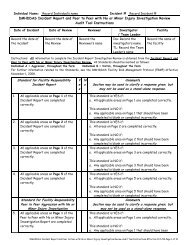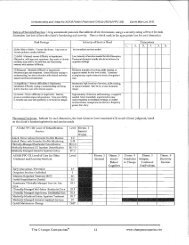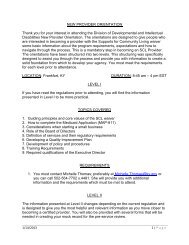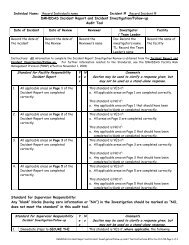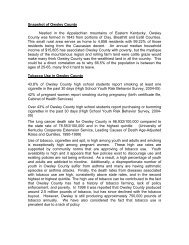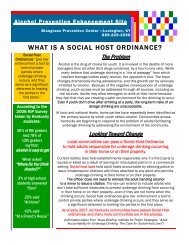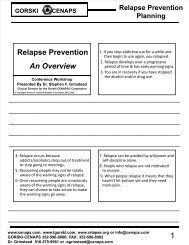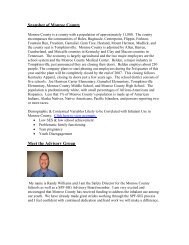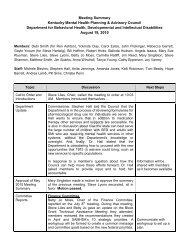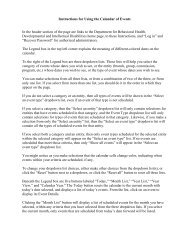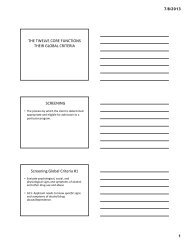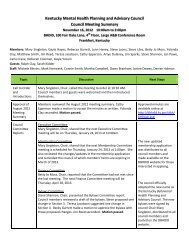Appendix E - Kentucky Cabinet for Health and Family Services
Appendix E - Kentucky Cabinet for Health and Family Services
Appendix E - Kentucky Cabinet for Health and Family Services
You also want an ePaper? Increase the reach of your titles
YUMPU automatically turns print PDFs into web optimized ePapers that Google loves.
<strong>Appendix</strong> E – Service CodesService Coding Instructions <strong>for</strong> the Event Data SetThis appendix describes the service codes to be used when reporting all services in the Event Data Set.The services reported in the Event Data Set should include all services provided during the reportingperiod <strong>for</strong> all payer sources. Specifically, the codes described in this appendix are used to complete fieldsSV101(2) HCPCS Procedure Code <strong>and</strong> NTE02 DMHMRS_Modifier_1 (DBHDID Service code).Instructions <strong>for</strong> coding <strong>Services</strong> dated July 1, 2014 or later. (Back-dated services with service datesprior to July 1, 2014 should follow coding instructions <strong>and</strong> use allowable values as set out in the FY2014Data Submission Guide.)The following illustrates the reporting requirements <strong>for</strong> SV101(2) <strong>and</strong> NTE02 fields based ondifferent payers <strong>for</strong> the services.Case #1: Primary Payer is DBHDID (“Y”)SV101(2): leave blank, enter a valid CPT or HCPCS procedure code, or enter the same3-digit code used in NTE02NTE02: Must contain a valid three-digit DMHMRS service code (see listing page AE-3)Case #2: Primary Payer is Medicaid (“D”)SV101(2): Enter a valid billing code as set out in the “DBHDID Service CodeDefinitions <strong>and</strong> Crosswalk” section which begins on page AE-3 herein. If a billing codeis not specified in the crosswalk section, you may use any valid CPT or HCPCSprocedure code.NTE02: Enter either1) A valid DBHDID Service code which is equivalent to the code entered inSV101(2) (see listing page AE-3)2) Code ‘99’ to signify that the code entered in SV101(2) is descriptive of theserviceCase #3: Other Primary PayerSV101(2): Enter a valid CPT or HCPCS procedure code (see listing page AE-3)NTE02: Must contain a valid three-digit DBHDID service code (see listing page AE-3)For every service reported in the Event Data Set, a valid Payer source must also be listed in field DAO-05(Source of Pay 1 Prime Payer).Units of Service1 Client Day: A client day shall begin at midnight <strong>and</strong> end 24 hours later. A part-day of admission shallcount as a full day.1 Client Hour: A client hour shall start when a face-to-face contact starts <strong>and</strong> shall end 60 minutes later<strong>for</strong> the initial unit. Beyond the initial unit, less than thirty (30) minutes shall be rounded down; thirtyminutes or later shall be rounded up. Example: Actual time 1 hour <strong>and</strong> 20 minutes = 1 hour. Roundingup is not allowed in Medicaid waiver or Impact Plus billing.Latest update: 8/8/2014Page AE-1
¼ Client Hour: A client quarter hour shall start when a face-to-face contact starts. For those serviceswhere a unit of service is 15 minutes, the time may be rounded up or down. An initial unit of service lessthan 15 minutes may be billed as one unit. Beyond the initial unit, service times less than half the unitshall be rounded down; service time equal to or greater than half the unit shall be rounded up. Example:20 minutes equals one unit. 25 minutes equals two units. Rounding up is not allowed in Medicaid waiveror Impact Plus billing.1 Staff Hour: A staff hour shall start when the service begins <strong>and</strong> shall end 60 minutes later <strong>for</strong> the initialunit. Beyond the initial unit, less than thirty (30) minutes shall be rounded down; thirty minutes or moreshall be rounded up. Rounding up is not allowed in Medicaid waiver or Impact Plus billing.¼ Staff Hour: A staff quarter hour shall start when the service begins. For those services where a unit ofservice is 15 minutes, the time may be rounded up or down. An initial unit of service less than 15minutes may be billed as one unit. Beyond the initial unit, service times less than half the unit shall berounded down; service time equal to or greater than half the unit shall be rounded up. Rounding up is notallowed in Medicaid waiver or Impact Plus billing.Special Units:Case Management Adult MH (060): A unit of service shall be one month; <strong>for</strong> a billable service to haveoccurred, at least 4 service contacts shall have occurred. Two of the contacts shall be face-to-face withthe client. The other two contacts many be face-to-face or by telephone with or on behalf of the client.Case Management Children MH (061): A unit of service shall be one month. For a billable service tohave occurred, at least 4 service contacts shall have occurred. Two of the contacts shall be face-to-facewith the client; at least one of these contacts shall be with the child <strong>and</strong> the other shall be with the family,parent(s), or person in custodial control. The other two contacts may be face-to-face or by telephone withor on behalf of the child.Notes:1. Rounding up is not allowed in Medicaid waiver or Impact Plus billing.2. When submitting Event Data <strong>for</strong> a service, all units <strong>for</strong> that service date shall be reported onone line of the Event Data Set. For example, a service is provided to a client <strong>for</strong> one hour.The unit of service <strong>for</strong> that service is 1/4 hour or fifteen (15) minutes. The event should bereported on one line as 4 units of service (i.e.., the client received 4 15-minute units).3. Throughout this document, “Behavioral <strong>Health</strong>” means that the service may apply to eitherthe mental health or substance use disorder programs.Latest update: 8/8/2014Page AE-2
DBHDID Service Code Definitions <strong>and</strong> CrosswalkThe purpose of this crosswalk is to guide providers in the development of the Event data file that issubmitted to the BHDID. In the chart below, codes listed in the column “Equivalent Billing Code(s)”may not specify every valid procedure code used <strong>for</strong> billing purposes per service. Since codes maychange over time, the BHDID will attempt to update this web-posted document as often as needed. Ifquestions come up, it is recommended that providers contact the DBHDID to secure the latest revision ofthis document. Contact: Hope.Barrett@ky.gov (502) 564-4860 ext 4527.Note: “Behavioral <strong>Health</strong>” means that the service may apply to either the mental health or substance usedisorder programsScreeningService NameAssessment 001Psychological Testing 020BHDID DataImplementation GuideEvent Field NTE02(DMHMRS_Modifier_1)"Service Code"DMHMRS_Modifier_1"DBHDID Service Code"101 (Mental <strong>Health</strong>);102 (Substance UseDisorder)Equivalent Billing Code(s)NOTE: This column may not specifyevery valid procedure code used to bill<strong>for</strong> services. The DBHDID recognizesthat codes may change over time.Contact the DBHDID <strong>for</strong> the mostrevised version of this living document<strong>and</strong> contact the managed careorganizations or Department <strong>for</strong>Medicaid <strong>Services</strong> <strong>for</strong> billing codes.90899 (Mental <strong>Health</strong>);H0002 (Substance Use Disorder)H0001 (Substance Use Disorder);H0031 (Mental <strong>Health</strong>)96101 (Behavioral <strong>Health</strong> orIntellectual Disabilities)Psychiatric Diagnostic Evaluation 010 90791; 90792 (with Med <strong>Services</strong>)Crisis Intervention 200Mobile Crisis 176Residential Crisis Stab138 (Adult);139 (Child/Youth)H2011; 90839 (Behavioral <strong>Health</strong> /Intellectual Disabilities)S9484 (Behavioral <strong>Health</strong> /Intellectual Disabilities)S9485 (Behavioral <strong>Health</strong>)Day Treatment 128 (Child/Youth
Individual Outpatient Therapy 050Individual Outpatient Therapy(Psychiatrist)05190832; 90833; 90834; 90836; 90837;90838; 90839; 90840 (Behavioral<strong>Health</strong>)90832; 90833; 90834; 90836; 90837;90838; 90839; 90840 (Behavioral<strong>Health</strong>)Group Outpatient Therapy 052 90853 (Behavioral <strong>Health</strong>)Intensive Outpatient Program<strong>Family</strong> Outpatient Therapy 253154 (Mental <strong>Health</strong>);153 (Substance UseDisorder)S9480 (Mental <strong>Health</strong>);H0015 (Substance Use Disorder)90846 (Behavioral <strong>Health</strong>) w/outclient present;90847 (Behavioral <strong>Health</strong>) w clientpresentCollateral Outpatient Therapy 254 90887 (Behavioral <strong>Health</strong>)Partial Hospitalization 255 H0035 (Behavioral <strong>Health</strong>)Service PlanningAssertive Community Treatment(ACT)201 (Mental <strong>Health</strong>);202 (Substance UseDisorder)H0032 (Mental <strong>Health</strong>);T1007 (Substance Use Disorder)256 H0040 (Mental <strong>Health</strong>)Comprehensive CommunitySupport (Mental <strong>Health</strong>)Therapeutic RehabilitationProgram (Mental <strong>Health</strong>)257129 (Child/Youth);130 (Adult)H2014, H2015, H2021 (Mental<strong>Health</strong>)H2019 (Mental <strong>Health</strong>)Residential <strong>Services</strong> <strong>for</strong> SubstanceUse DisordersScreening, Brief Intervention, <strong>and</strong>Referral to Treatment (SBIRT)(Treatment <strong>for</strong> Substance UseDisorder Only)Medication Assisted Treatment(MAT) (Treatment <strong>for</strong> SubstanceUse Only)118 (Short Term);119 (Long Term)258H0018 - Short TermH0019 - Long Term99408, H0049, H0050 (SubstanceUse Disorder)259 H0020 (Substance Use Disorder)Assessment DUI/AI 003 Valid procedure code if applicable *PASRR Level II Evaluation 004 T2011 or other valid procedure codeConsultation PASRR 006 Valid procedure code if applicable *Latest update: 8/8/2014Page AE-4
Special Evaluation <strong>and</strong>Consultation (IFBSS)021 No required procedure code **Intervention <strong>Services</strong> (IFBSS) 022 No required procedure code **Intervention <strong>Services</strong> - OvernightCare (IFBSS)023 No required procedure code **Miscellaneous <strong>Services</strong> Purchased 024 No required procedure code **Miscellaneous Goods Purchased 025 E1399 or other valid procedure codeTherapeutic Foster <strong>Family</strong>TreatmentRespite Care (IntellectualDisabilities)Specialized Personal Care Home<strong>Services</strong> (Mental<strong>Health</strong>/Intellectual Disabilities)Residential Support (SupportedHousing per diem)027 S5145 or valid procedure code031 T1005037 Valid procedure code if applicable *040 H0043 or other valid procedure codeDetoxification (non-medical) 041 H0014Detoxification (medical) 042H0008 (Alcohol);H0009 (Other Drug)Supported Housing - PsychosocialRehabilitation <strong>Services</strong>Case Management <strong>for</strong> Adults withSerious Mental Illness (SMI)Case Management <strong>for</strong> Childrenwith Severe Emotional Disorder(SED)Case Management <strong>for</strong> Individualswith Intellectual Disabilities (ID)Case Management <strong>for</strong> Individualswith Moderate to Severe SubstanceUse Disorder (SUD) OR Pregnantor Partum with Any Substance UseDisorder043 H2017 or other valid procedure code060 T2022061 T2023162 T2022063 H0006Latest update: 8/8/2014Page AE-5
Intensive Case Management <strong>for</strong>Adults with SMI, Children orYouth with SED, adults orchildren with a Substance UseDisorder, AND a Co-OccurringPhysical <strong>Health</strong> Diagnosis260 (Serious Mental Illness);261 (Severe EmotionalDisorder);263 (Substance UseDisorder)Valid procedure code if applicable *DUI Education 070 Valid procedure code if applicable *Mental <strong>Health</strong> Prevention 072 Valid procedure code if applicable *Consultation 073 Valid procedure code if applicable *Outreach <strong>and</strong> Education 174 Valid procedure code if applicable *Transition (IntellectualDisabilities)Adult Foster Care HomeResidential Supports (IntellectualDisabilities)Career Planning (IntellectualDisabilities)274 Valid procedure code if applicable *177 T2016; S9976178 T2021Community Living Supports(SCL-1); Personal Assistance(SCL-2)Day Training (IntellectualDisabilities)Alternative Residential (in ownhome, or technology assistedresidential) (IntellectualDisabilities)17918118297535 (Community Living SupportsSCL-1)T1019 (Personal Assistance SCL-2)T2021;S5100S9976;T2031Behavioral Support (IntellectualDisabilities)084 96152Supported Employment 085Community Access (IntellectualDisabilities)186Occupational Therapy 087H2023; H2025;T2019 (when billed with modifiers:U4 PCJS DiscoveryU5 Job Development & AnalysisU6 Job Acquisition w Support)97535 (Individual);97537 (Group);97530;97139 (when billed with GOmodifier)Latest update: 8/8/2014Page AE-6
Physical Therapy 08897110;97139 (when billed with GP modifier)Speech Therapy 089 92507PASRR Specialized <strong>Services</strong>(Intellectual Disabilities)PASRR Goods Purchased(Intellectual Disabilities)Crisis Prevention (IntellectualDisabilities)Group Home Residential Supports(Intellectual Disabilities)<strong>Family</strong> Home Residential Supports(Intellectual Disabilities)Staffed Residence ResidentialSupports (Intellectual Disabilities)Person Centered Coach(Intellectual Disabilities)Consultative Clinical <strong>and</strong>Therapeutic <strong>Services</strong> (IntellectualDisabilities)090 Valid procedure code if applicable *094 Valid procedure code if applicable *191 Valid procedure code if applicable *095 T2016 (when billed with US modifier)096 T2016097 T2016 (when billed with UP modifier)292 H0023293 H0004Unknown / Not Collected 098 Valid procedure code if applicable *Other non-BHDID ServiceSpecified in SV101(2)099 Valid procedure code if applicable **Valid procedure code if applicable – If Medicaid is the payer <strong>for</strong> the service, use a valid CPT or HCPCScode. Otherwise, follow instructions <strong>for</strong> populating the SV101(2) field <strong>for</strong> non-Medicaid payers.**No required procedure code – Code not generally used <strong>for</strong> Medicaid services. Follow instructions <strong>for</strong>populating the SV101(2) field <strong>for</strong> non-Medicaid payers.Latest update: 8/8/2014Page AE-7
DMHMRS Service Code Definitions with Service CodesScreeningSV101(2):90899 (Mental <strong>Health</strong>);H0002 (Substance Use Disorder);or other valid procedure codeNTE02:101 (Mental <strong>Health</strong>)102 (Substance Use Disorder)Unit of Service:15 MinutesLink to DBHDID Service St<strong>and</strong>ardDefinition:Screening shall be the determination of the likelihood that a person has a mental health, substance use, orco-occurring disorder. The purpose is not to establish the presence or specific type of such a disorder butto establish the need <strong>for</strong> an in-depth assessment. <strong>Services</strong> shall be provided in accordance with applicable<strong>Kentucky</strong> Statute <strong>and</strong> Regulations.AssessmentSV101(2):H0001 (Substance Use Disorder);H0031 (Mental <strong>Health</strong>);NTE02: 001Unit of Service: 15 MinutesLink to DBHDID Service St<strong>and</strong>ardDefinition:Assessment shall include gathering in<strong>for</strong>mation <strong>and</strong> engaging in a process with the client that enables theprovider to establish the presence or absence of a mental health <strong>and</strong>/or substance use disorder, determinethe client’s readiness <strong>for</strong> change, identify client strengths or problem areas that may affect the processesof treatment <strong>and</strong> recovery, <strong>and</strong> engage the client in the development of an appropriate treatmentrelationship. The purpose of an assessment is to establish (or rule out) the existence of a clinical disorderor service need <strong>and</strong> to work with the client to develop a treatment <strong>and</strong> service plan. This does not includepsychological or psychiatric evaluations or assessments. <strong>Services</strong> shall be provided in accordance withapplicable <strong>Kentucky</strong> Statute <strong>and</strong> Regulations.Latest update: 8/8/2014Page AE-8
Psychological Testing (Behavioral <strong>Health</strong> or Intellectual Disabilities)SV101(2): 96101 or other valid procedure codeNTE02: 020Unit of Service: 15 MinutesLink to DBHDID Service St<strong>and</strong>ardDefinition:Psychological evaluation. Psychological testing <strong>for</strong> individuals with mental health, substance use, or cooccurringmental health <strong>and</strong> substance use disorders may include psychodiagnostic assessment ofpersonality, psychopathology, emotionality, <strong>and</strong>/or intellectual abilities. Also includes interpretation <strong>and</strong>written report of testing results.For ID program: Psychological Testing <strong>for</strong> diagnostic purposes to determine eligibility <strong>for</strong> availableprograms. Shall be provided by a licensed psychologist, licensed psychological practitioner, licensedpsychological associate, certified psychologist with autonomous functioning, or certified schoolpsychologist within their scope of practice. <strong>Services</strong> shall be provided in accordance with applicable<strong>Kentucky</strong> Statute <strong>and</strong> Regulations.Psychiatric Diagnostic EvaluationSV101(2): 90791, 90792 (w/ med services), or other valid procedure codeNTE02: 010Unit of Service: 15 MinutesDefinition:Psychiatric diagnostic interview <strong>and</strong> examination including history, mental status, or disposition, mayinclude communication with family or other sources, ordering <strong>and</strong> medical interpretation of laboratory orother medical diagnostic studies. Includes diagnostic review of medications, diagnostic review <strong>and</strong>interpretation of Physical Examination from outside physician. Does not include consultation <strong>for</strong>psychiatric evaluation of a patient. <strong>Services</strong> shall be provided in accordance with applicable <strong>Kentucky</strong>Statute <strong>and</strong> Regulations.Crisis Intervention (Behavioral <strong>Health</strong> / Intellectual Disabilities)SV101(2): H2011, 90839 or other valid procedure codeNTE02: 200Unit of Service:15 MinutesLink to DBHDID Service St<strong>and</strong>ardLatest update: 8/8/2014Page AE-9
Definition:Crisis Intervention shall be a therapeutic intervention provided <strong>for</strong> the purpose of immediately reducing oreliminating risk of physical or emotional harm to the client, or others. This service shall be provided asan immediate relief to the presenting problem or threat. It must be followed by non-crisis service referralas appropriate. It must be provided in a face-to-face, one-on-one encounter between the provider <strong>and</strong> theclient. <strong>Services</strong> shall be provided in accordance with applicable <strong>Kentucky</strong> Statute <strong>and</strong> Regulations.Crisis intervention may include further service prevention planning such as lethal means reduction <strong>for</strong>suicide risk <strong>and</strong> substance use relapse prevention.Mobile Crisis (Behavioral <strong>Health</strong> / Intellectual Disabilities)SV101(2): S9484 or other valid procedure codeNTE02: 176Unit of Service:1 HourLink to DBHDID Service St<strong>and</strong>ardDefinition:This code should be used <strong>for</strong> mobile <strong>for</strong> both adults <strong>and</strong> children.Mobile Crisis <strong>Services</strong> are designed to provide community-based interventions <strong>and</strong> supports <strong>for</strong> thoseexperiencing a mental health or behavioral health crisis. The intent is to provide crisis services at theclient’s location rather than requiring the client to leave his/her environment. The response may involveone or more staff members. <strong>Services</strong> shall be provided in accordance with applicable <strong>Kentucky</strong> Statute<strong>and</strong> Regulations.Mobile Crisis provides the same services as crisis intervention, except the location <strong>for</strong> the service is not inthe office. <strong>Services</strong> are available 24 hours a day, seven (7) days a week, 365 days a year. This service isprovided in duration of less than 24 hours <strong>and</strong> is not an overnight service. This service provides crisisresponse in home or community to provide an immediate evaluation, triage <strong>and</strong> access to acute behavioralhealth services including treatment <strong>and</strong> supports to effect symptom reduction, harm reduction or to safelytransition persons in acute crises to appropriate least restrictive level of care.Special Note:Requires completion of field “Place of Service” SV105 (FAO-07) which cannot be “in office”.Residential Crisis Stabilization (Behavioral <strong>Health</strong>)SV101(2): S9485 or other valid procedure codeNTE02:138 (Adult)139 (Child/Youth)Latest update: 8/8/2014Page AE-10
Units of Service:per DiemLink to DBHDID Service St<strong>and</strong>ardDefinition:Residential Crisis Stabilization services are provided in Crisis Stabilization Units. Crisis StabilizationUnits are community-based, residential programs that offer an array of services including screening,assessment, treatment planning, individual, group, <strong>and</strong> family therapy, <strong>and</strong> peer support in order tostabilize a crisis <strong>and</strong> divert the individual from a higher level of care. It is not part of a hospital. They areused when individuals in a behavioral health emergency cannot be safely accommodated within thecommunity, are not in need of hospitalization but need overnight care. The purpose is to stabilize theindividual, provide treatment <strong>for</strong> acute withdrawal, when appropriate, <strong>and</strong> re-integrate them back into thecommunity, or other appropriate treatment setting, in a timely fashion. These units provide a non-hospitalresidential setting <strong>and</strong> services 24-hours per day, seven days per week, 365 days a year. The estimatedlength of stay <strong>for</strong> children is three to five days. The estimated length of stay <strong>for</strong> adults is seven to 10 days.The component services of crisis stabilization units are screening, assessment, service planning,psychiatric services, individual therapy, family therapy, group therapy, <strong>and</strong> peer support. <strong>Services</strong> shall beprovided in accordance with applicable <strong>Kentucky</strong> Statute <strong>and</strong> Regulations.Residential crisis stabilization does not include, <strong>and</strong> FFP is not available <strong>for</strong>, room <strong>and</strong> board services;educational, vocational <strong>and</strong> job training services; habilitation services; services to inmates in publicinstitutions as defined in 42 CFR §435.1010; services to individuals residing in institutions <strong>for</strong> mentaldiseases as described in 42 CFR§435.1010; recreational <strong>and</strong> social activities; <strong>and</strong> services that must becovered elsewhere in the state Medicaid plan.Day Treatment (Behavioral <strong>Health</strong>) (Child/Youth
Physical education <strong>and</strong> recreational therapies; Transportation; <strong>and</strong> Transition planning.Day treatment services do not include services covered in a child’s Individualized Education Plan (IEP).Day treatment services shall be provided: In collaboration with the education services of the Local Education Authority (LEA) includingthose provided through IDEA <strong>and</strong>/or Section 504; On school days <strong>and</strong> during scheduled breaks; In coordination with the recipient's individual educational plan, if the recipient has an individualeducational plan; With a linkage agreement to other behavioral health services with the LEA that specifies theresponsibilities of the LEA <strong>and</strong> the day treatment provider.Peer Support (Behavioral <strong>Health</strong>)SV101(2): H0038 or other valid procedure codeNTE02:145 (Individual)146 (Group)Unit of Service:15 MinutesLink to DBHDID Service St<strong>and</strong>ard <strong>for</strong> AdultsLink to DBHDID Service St<strong>and</strong>ard <strong>for</strong> YouthDefinition:Peer Support is emotional support that is provided by persons having a mental health, substance use, orco-occurring mental health <strong>and</strong> substance use disorder to others sharing a similar mental health, substanceuse, or co-occurring mental health <strong>and</strong> substance use disorder in order to bring about a desired social orpersonal change. It is an evidence based practice. Peer Support <strong>Services</strong> are structured <strong>and</strong> scheduled nonclinicalbut therapeutic activities with individual clients or groups provided by a self-identified consumerof mental health, substance use, or co-occurring mental health <strong>and</strong> substance use disorder services whohas been trained <strong>and</strong> certified in accordance with state regulations. <strong>Services</strong> should promote socialization,recovery, self-advocacy, preservation <strong>and</strong> enhancement of community living skills <strong>for</strong> the client. <strong>Services</strong>shall be provided in accordance with applicable <strong>Kentucky</strong> Statute <strong>and</strong> Regulations specifically 908 KAR2:220 (Adult Peer Support) <strong>and</strong> 908 KAR 2:240 (Youth Peer Support)Parent/<strong>Family</strong> Peer Support (Behavioral <strong>Health</strong>)SV101(2): H0038 or other valid procedure codeNTE02:147 (Individual)148 (Group)Latest update: 8/8/2014Page AE-12
Unit of Service:15 MinutesLink to DBHDID Service St<strong>and</strong>ardDefinition:Parent/<strong>Family</strong> Peer Support is emotional support that is provided by parents or family members ofchildren having a mental health, substance use, or co-occurring mental health <strong>and</strong> substance use disorderto parents or family members with a child sharing a similar mental health, substance use, or co-occurringmental health <strong>and</strong> substance use disorder in order to bring about a desired social or personal change. It isan evidence based practice. Peer Support <strong>Services</strong> are structured <strong>and</strong> scheduled non-clinical buttherapeutic activities with individuals or groups provided by a self-identified parent /family member of achild/youth consumer of mental health, substance use, or co-occurring mental health <strong>and</strong> substance usedisorder services who has been trained <strong>and</strong> certified in accordance with state regulations. <strong>Services</strong> shouldpromote socialization, recovery, self-advocacy, preservation <strong>and</strong> enhancement of community living skills<strong>for</strong> the client. <strong>Services</strong> shall be provided in accordance with applicable <strong>Kentucky</strong> Statute <strong>and</strong> Regulations908 KAR 2:230.Individual Outpatient TherapySV101(2): 90832, 90833, 90834, 90836, 90837, 90838, 90839, 90840, or valid procedure codeNTE02: 050Unit of Service:15 MinutesLink to DBHDID Service St<strong>and</strong>ardDefinition:Individual Therapy shall consist of a face-to-face therapeutic intervention provided in accordance with arecipient’s identified treatment plan <strong>and</strong> is aimed at the reduction of adverse symptoms <strong>and</strong> improvedfunctioning. Individual therapy must be provided as a one-on-one encounter between the provider <strong>and</strong> theclient. Individual therapy services shall be limited to a maximum of three (3) hours per day, per client,but can be exceeded based on medical necessity. <strong>Services</strong> shall be provided in accordance with applicable<strong>Kentucky</strong> Statute <strong>and</strong> Regulations.Individual Outpatient Therapy (Psychiatrist)SV101(2): 90832, 90833, 90834, 90836, 90837, 90838, 90839, 90840, or valid procedure codeNTE02: 051Unit of Service:15 MinutesLink to DBHDID Service St<strong>and</strong>ardLatest update: 8/8/2014Page AE-13
Definition:A therapeutic service provided by a psychiatrist. <strong>Services</strong> shall be provided in accordance with applicable<strong>Kentucky</strong> Statute <strong>and</strong> Regulations.Group TherapySV101(2): 90853 or valid procedure codeNTE02: 052Unit of Service:15 MinutesLink to DBHDID Service St<strong>and</strong>ardDefinition:Group therapy shall be therapeutic intervention provided to a group of unrelated persons. A groupconsists of no more than eight persons. It is usually <strong>for</strong> a limited time period (generally 1 to 1 ½ hours induration). In group therapy, clients are involved with one another at a cognitive <strong>and</strong> emotional level.Group therapy focuses on psychological needs of the clients as evidenced in each client’s plan oftreatment. Group therapy centers on goals such as building <strong>and</strong> maintaining healthy relationships,personal goal setting, <strong>and</strong> the exercise of personal judgment. The group shall have a deliberate focus <strong>and</strong>must have a defined course of treatment. Individual notes must be written <strong>for</strong> each recipient within thegroup <strong>and</strong> be kept in that individual’s medical record. <strong>Services</strong> shall be provided in accordance withapplicable <strong>Kentucky</strong> Statute <strong>and</strong> Regulations.<strong>Services</strong> shall be limited to a maximum of three (3) hours of group therapy per day, per client, but can beexceeded based on medical necessity.Intensive Outpatient Program (IOP)SV101(2):S9480 (Mental <strong>Health</strong>)H0015 (Substance Use Disorder)or other valid procedure codeNTE02:154 (Mental <strong>Health</strong>);153 (Substance Use Disorder)Unit of Service:per DiemLink to DBHDID Service St<strong>and</strong>ardDefinition:Intensive Outpatient Program is an alternative to inpatient hospitalization or partial hospitalization <strong>for</strong>mental health <strong>and</strong>/or substance use disorders. An intensive outpatient program must offer a multi-modal,multi-disciplinary structured outpatient treatment program that is significantly more intensive thanLatest update: 8/8/2014Page AE-14
individual, group, <strong>and</strong> family therapies. <strong>Services</strong> shall be provided in accordance with applicable<strong>Kentucky</strong> Statute <strong>and</strong> Regulations.IOP services must be provided at least three (3) hours per day <strong>and</strong> at least three (3) days per week.Programming must include individual therapy, group therapy, <strong>and</strong> family therapy unless contraindicated,Crisis Intervention as it would occur in the setting where IOP is being provided, <strong>and</strong> psychoeducation(Psychoeducation is one component of outpatient therapy <strong>for</strong> mental health conditions. Duringpsychoeducation, the client <strong>and</strong>/or their family is provided with knowledge about their diagnosis, thecauses of that condition, <strong>and</strong> the reasons why a particular treatment might be effective <strong>for</strong> reducing theirsymptoms. Clients <strong>and</strong> their families gain empowerment to underst<strong>and</strong> <strong>and</strong> accept the diagnosis <strong>and</strong> learnto cope with it in a successful manner).All treatment plans must be individualized, focusing on stabilization <strong>and</strong> transition to a lesser level ofcare.The State does not claim IOP that is located in a hospital as a rehabilitative service.<strong>Family</strong> Outpatient TherapySV101(2): 90846 (w/out client present);90847 (w/client present);or other valid procedure codeNTE02: 253Unit of Service:15 MinutesLink to DBHDID Service St<strong>and</strong>ardDefinition:<strong>Family</strong> Therapy shall consist of a face to face therapeutic intervention provided through scheduledtherapeutic visits between the therapist <strong>and</strong> the recipient <strong>and</strong> one or more members of a recipient’s familyto address issues interfering with the relational functioning of the family <strong>and</strong> improve interpersonalrelationships within the home environment. <strong>Services</strong> shall be provided in accordance with applicable<strong>Kentucky</strong> Statute <strong>and</strong> Regulations.The need <strong>for</strong> family therapy shall be so stated in the client’s plan of treatment. <strong>Family</strong> therapy servicesshall be <strong>for</strong> the benefit of the clientCollateral Outpatient TherapySV101(2): 90887 or other valid procedure codeNTE02: 254Unit of Service:15 MinutesLatest update: 8/8/2014Page AE-15
Link to DBHDID Service St<strong>and</strong>ardDefinition:Collateral services shall be limited to recipients under the age of twenty-one, who are clients of therendering provider. A collateral service shall be a face-to-face encounter with a parent/caregiver, legalrepresentative/guardian, school personnel or other person in a position of custodial control or supervisionof the client, <strong>for</strong> the purpose of providing counseling or consultation on behalf of a client in accordancewith an established plan of treatment. The parent or legal representative in a role of supervision of theclient shall give written approval <strong>for</strong> this service. This written approval shall be kept in the recipient’smedical record. This service is only reimbursable <strong>for</strong> a recipient under age 21. <strong>Services</strong> shall be providedin accordance with applicable <strong>Kentucky</strong> Statute <strong>and</strong> Regulations.Partial Hospitalization (Behavioral <strong>Health</strong>)SV101(2): H0035 or other valid procedure codeNTE02: 255Units of Service:Per DiemLink to DBHDID Service St<strong>and</strong>ardDefinition:Partial Hospitalization is a short-term (average of four to six weeks), less than 24-hour, intensivetreatment program <strong>for</strong> individuals experiencing significant impairment to daily functioning due tosubstance use disorders, mental health disorders, or co-occurring mental health <strong>and</strong> substance usedisorders. Partial Hospitalization may be provided to adults or children. Admission criteria are based onan inability to adequately treat the client through community-based therapies or intensive outpatientservices. The program will consist of individual, group, family therapies <strong>and</strong> medication management.Educational, vocational, or job training services that may be provided as part of Partial Hospitalization arenot reimbursed by Medicaid. The program has an agreement with the local educational authority to comeinto the program to provide all educational components <strong>and</strong> instruction which are not Medicaid billable orreimbursable. <strong>Services</strong> in a Medicaid-eligible child’s Individual Education Plan (IEP) are coverable underMedicaid. <strong>Services</strong> shall be provided in accordance with applicable <strong>Kentucky</strong> Statute <strong>and</strong> Regulations.Partial Hospitalization is typically provided <strong>for</strong> a lesser number hours per day <strong>and</strong> days per week thanDay Treatment. Partial Hospitalization is typically focused on one primary presenting problem (i.e.Substance use, sexual reactivity, etc.). Day treatment is typically provided <strong>for</strong> more hours per day <strong>for</strong>more days per week, requires more treatment components <strong>and</strong> often lasts <strong>for</strong> a longer period of time E.g.,three months), compared to partial hospitalization. Day treatment may focus on resolving multiple mentalhealth <strong>and</strong>/or substance use issues <strong>and</strong> is typically provided as an alternative to a school or othertraditional day time setting <strong>for</strong> children.Service PlanningSV101(2):Latest update: 8/8/2014Page AE-16
H0032 (Mental <strong>Health</strong>);T1007 (Substance Use Disorder);or other valid procedure codeNTE02:201 (Mental <strong>Health</strong>)202 (Substance Use Disorder)Units of Service:15 MinutesLink to DBHDID Service St<strong>and</strong>ardDefinition:Service planning involves assisting the recipient in creating an individualized plan <strong>for</strong> services needed <strong>for</strong>maximum reduction of mental disability <strong>and</strong> restoration of a recipient to his best possible functional level.A person centered planning process is required. The plan is directed by the recipient <strong>and</strong> must includepractitioners of the recipient’s choosing. The providers include more than licensed professionals – it mayinclude the recipient (<strong>and</strong> his guardian if applicable), care coordinator, other service providers, familymembers or other individuals that the recipient chooses. <strong>Services</strong> shall be provided in accordance withapplicable <strong>Kentucky</strong> Statute <strong>and</strong> Regulations.Assertive Community Treatment (ACT) - TREATMENT OF MENTAL HEALTHSV101(2): H0040 or other valid procedure codeNTE02: 256Units of Service:per MonthLink to DBHDID Service St<strong>and</strong>ardDefinition:Assertive community treatment (ACT) is an evidence-based psychiatric rehabilitation practice whichprovides a comprehensive approach to service delivery <strong>for</strong> consumers with serious mental illnesses. ACTuses a multidisciplinary team of professionals including psychiatrists, nurses, case managers, therapists<strong>and</strong> peer support specialists. Component services include assessment, treatment planning, casemanagement, psychiatric services (including evaluation diagnosis <strong>and</strong> treatment of mental health <strong>and</strong>/orsubstance use disorders, case consultation, prescribing, <strong>and</strong> medication management delivered by alicensed professional), medication management including administration, individual <strong>and</strong> group therapy,peer support, mobile crisis intervention, mental health consultation, family support <strong>and</strong> basic living skills.Mental health consultation involves brief, collateral interactions with other treating professionals whomay have in<strong>for</strong>mation <strong>for</strong> the purposes of treatment planning <strong>and</strong> service delivery. <strong>Family</strong> supportinvolves the ACT team working with the recipient’s natural support systems to improve family relationsin order to reduce conflict <strong>and</strong> increase recipient autonomy <strong>and</strong> independent functioning. Basic livingskills are rehabilitative services focused on teaching activities of daily living (i.e., taking medications,housekeeping, meal preparation, hygiene, interacting with neighbors) necessary to maintain independentfunctioning <strong>and</strong> community living. Psychiatric services as a component of the ACT service includesevaluation, diagnosis <strong>and</strong> treatment of mental health <strong>and</strong> or substance use disorders, case consultation,Latest update: 8/8/2014Page AE-17
prescribing <strong>and</strong> medication management delivered by a licensed professional (i.e. psychiatrist, APRN).<strong>Services</strong> shall be provided in accordance with applicable <strong>Kentucky</strong> Statute <strong>and</strong> Regulations.Comprehensive Community Support <strong>Services</strong> TREATMENT OF MENTAL HEALTH ONLYSV101(2): H2014, H2015, H2021, or other valid procedure codeNTE02: 257Units of Service:15 MinutesLink to DBHDID Service St<strong>and</strong>ardDefinition:Comprehensive Community Support <strong>Services</strong> covers activities necessary to allow individuals with mentalillnesses to live with maximum independence in the community. Activities are intended to assuresuccessful community living through utilization of skills training as identified in the individual serviceplan. Skills training is designed to reduce mental disability <strong>and</strong> restore the recipient to his best possiblefunctional level. Comprehensive community support services consists of using a variety of psychiatricrehabilitation techniques to improve daily living skills (hygiene, meal preparation, medication adherence),self-monitoring of symptoms <strong>and</strong> side effects, emotional regulation skills, crisis coping skills <strong>and</strong>developing <strong>and</strong> enhancing interpersonal skills. <strong>Services</strong> shall be provided in accordance with applicable<strong>Kentucky</strong> Statute <strong>and</strong> Regulations specifically 908 KAR 2:250.Therapeutic Rehabilitation Program TREATMENT OF MENTAL HEALTHSV101(2): H2019 or other valid procedure codeNTE02:129 (Children/Youth)130 (Adult)Unit of Service:15 MinutesLink to DBHDID Service St<strong>and</strong>ard <strong>for</strong> ChildrenLink to DBHDID Service St<strong>and</strong>ard <strong>for</strong> AdultsDefinition:A Therapeutic Rehabilitation Program is a rehabilitative service <strong>for</strong> adults with serious mental illnesses<strong>and</strong> children with serious emotional disabilities designed to maximize reduction of mental disability <strong>and</strong>restoration of the recipient’s best possible functional level. <strong>Services</strong> shall be designed <strong>for</strong> the reduction indisabilities related to social, personal, <strong>and</strong> daily living skills, as well as the restoration of these skills. Therecipient establishes his own rehabilitation goals within the person centered service plan. Componentservices are delivered using a variety of psychiatric rehabilitation techniques <strong>and</strong> focus on improvingdaily living skills (hygiene, meal preparation, <strong>and</strong> medication adherence), self-monitoring of symptoms<strong>and</strong> side effects, emotional regulation skills, crisis coping skills <strong>and</strong> interpersonal skills. <strong>Services</strong> may beLatest update: 8/8/2014Page AE-18
delivered individually or in a group. <strong>Services</strong> shall be provided in accordance with applicable <strong>Kentucky</strong>Statute <strong>and</strong> Regulations.Residential <strong>Services</strong> <strong>for</strong> Substance Use Disorders (SUDS) TREATMENT FOR SUBSTANCE USEONLYSV101(2):H0018 (Short Term);H0019 (Long Term);or other valid procedure codeNTE02:118 (Short Term)119 (Long Term)Units of Service:per DiemLink to DBHDID Service St<strong>and</strong>ardDefinition:Residential services <strong>for</strong> substance use disorders is residential treatment (24 hour/day) that may be shorttermor long-term <strong>for</strong> the purposes of providing intensive treatment <strong>and</strong> skills building, in a structured <strong>and</strong>supportive environment, to assist individuals (children <strong>and</strong> adults) to obtain abstinence <strong>and</strong> enter intoalcohol/drug addiction recovery. This service is provided in a 24 hour live- in facility that offers aplanned <strong>and</strong> structured regimen of care that aims to treat persons with addictions or substance usedisorders <strong>and</strong> assists them in making the necessary changes in their lives that will enable them to live drugor alcohol free lives. Individuals must have been assessed <strong>and</strong> meet criteria <strong>for</strong> approval of residentialservices, utilizing a nationally recognized assessment tool (e.g., American Society of Addiction Medicine(ASAM) as approved by the DBHDID.<strong>Services</strong> should have more than eight (8), but less than or equal to16 patient beds; be under the medicaldirection of a physician; <strong>and</strong> provide continuous nursing services.Residential treatment services shall be based on individual need <strong>and</strong> may include: Screening Assessment Service Planning Individual Therapy Group Therapy <strong>Family</strong> Therapy Peer SupportService provision must be in accordance with KY licensure <strong>for</strong> procedures <strong>and</strong> st<strong>and</strong>ards <strong>for</strong> persons <strong>and</strong>agencies operating nonmedical/non-hospital based alcohol <strong>and</strong> others drug abuse treatment programs <strong>and</strong>the individually credentialed personnel as outlined in the state law (908 KAR 1:370).There are two levels of residential treatment: Short term –length of stay-14-28 daysLatest update: 8/8/2014Page AE-19
Long term- length of stay 28- 90 daysShort TermShort-term services should have duration of less than thirty (30) days, but can be exceeded based onmedical necessity. 24 hour staff as required by licensing regulations.Planned Clinical program activities constituting at least 15 hours per week of structured professionallydirected treatment services to stabilize <strong>and</strong> maintain a person’s substance use disorder <strong>and</strong> to help him orher to develop <strong>and</strong> apply recovery skills.<strong>Services</strong> may include: Screening Assessment Service Planning Individual Therapy Group Therapy <strong>Family</strong> Therapy Peer SupportLong Term24 hour staff as required by licensing regulationsPlanned clinical program activities constituting 40 hours per week of structured professionally directedtreatment services to stabilize <strong>and</strong> maintain a person’s substance use <strong>and</strong> or substance use <strong>and</strong> mentalhealth disorder <strong>and</strong> to help him or her to develop <strong>and</strong> apply recovery skills<strong>Services</strong> may include:ScreeningAssessmentService PlanningIndividual TherapyGroup Therapy<strong>Family</strong> TherapyPeer SupportResidential SUD treatment programs do not include, <strong>and</strong> FFP is not available <strong>for</strong>, room <strong>and</strong> boardservices; educational, vocational <strong>and</strong> job training services; habilitation services; services to inmates inpublic institutions as defined in 42 CFR §435.1010; services to individuals residing in institutions <strong>for</strong>mental diseases as described in 42 CFR§435.1010; recreational <strong>and</strong> social activities; <strong>and</strong> services thatmust be covered elsewhere in the state Medicaid plan. <strong>Services</strong> must be provided in a residential unit with16 or fewer beds or, if provided within multiple units operating as on unified facility, 16 or feweraggregated beds.Screening, Brief Intervention, <strong>and</strong> Referral to Treatment (SBIRT) - TREATMENT OFSUBSTANCE USE DISORDERS ONLYSV101(2): 99408, H0049, H0050, or other valid procedure codeNTE02: 258Latest update: 8/8/2014Page AE-20
Units of Service:15 MinutesLink to DBHDID Service St<strong>and</strong>ardDefinition:SBIRT is an evidence-based early intervention approach that targets individuals with non-dependentsubstance use to provide effective strategies <strong>for</strong> intervention prior to the need <strong>for</strong> more extensive orspecialized treatment. SBIRT consists of three major components:Screening – Assessing an individual <strong>for</strong> risky substance use behaviors using st<strong>and</strong>ardized screening tools;Brief Intervention – Engaging a patient showing risky substance use behaviors in a short conversation,providing feedback <strong>and</strong> advice; <strong>and</strong>Referral to Treatment – Provides a referral to additional mental health, substance use, or co-occurringmental health <strong>and</strong> substance use disorder services to patients who screen in need of additional services toaddress substance use. The Referral to Treatment is part of the Brief Intervention <strong>and</strong> thus to a behavioralhealth rehabilitative service.<strong>Services</strong> shall be provided in accordance with applicable <strong>Kentucky</strong> Statute <strong>and</strong> Regulations.Medication Assisted Treatment (MAT) TREATMENT FOR SUBSTANCE USE DISORDERS ONLYSV101(2): H0020 or other valid procedure codeNTE02: 259Units of Service: 15 MinutesLink to DBHDID Service St<strong>and</strong>ardDefinition:Any opioid addiction treatment that includes a U.S. Food <strong>and</strong> Drug Administration (FDA) approvedmedication <strong>for</strong> the detoxification or maintenance treatment of opioid addiction (e.g., methadone, levoalphaacetyl methadol [LAAM], buprenorphine, buprenorphinenaloxone, naltrexone) along withcounseling <strong>and</strong> other supports, including urine drug screen. <strong>Services</strong> may be provided in an OpioidTreatment Program (OTP), a medication unit affiliated with an OTP, or, with the exception ofMethadone, a physician’s office or other community based setting including the recipient’shome/residence, homeless shelter, school (only if not an IEP covered service), or other community settingwhere the recipient may wish/need to receive a service. Providers are instructed through regulations thatthe confidentiality of the client must be maintained in any setting where a service may occur. MATincreases the likelihood <strong>for</strong> cessation of illicit opioid use or of prescription opioid abuse. MATs are nonresidential<strong>and</strong> must comply with all state laws. <strong>Services</strong> shall be provided in accordance with applicable<strong>Kentucky</strong> Statute <strong>and</strong> Regulations.Opioid Treatment Program or “OTP” means a substance abuse program using approved controlledsubstances <strong>and</strong> offering a range of treatment procedures <strong>and</strong> services <strong>for</strong> the rehabilitation of personsdependent on opium, morphine, heroin or any derivative or synthetic drug of that group. A “medicationLatest update: 8/8/2014Page AE-21
unit affiliated with an OTP” means a Medication Station or Dosing Location that obtains its drug supplyfrom the main program site <strong>and</strong> retains all records (except dosing, urine screens) at the main location.Main program means the location of the MAT program where all administrative <strong>and</strong> medical in<strong>for</strong>mationrelated to the narcotic treatment program is retained <strong>for</strong> the purpose of on-site reviews by federal agenciesor the state narcotic authority or state opioid treatment authority designee. Service components include: Individual <strong>and</strong> Group therapy Dosing Medication Assessment <strong>and</strong> Urine Drug screensAssessment DUI/AISV101(2): Valid procedure code if applicable *NTE02: 003Unit of Service: 1 AssessmentDefinition:Procedure applied to a person convicted of DUI that includes the administration of a computerizedassessment instrument; a structured interview; a determination by the assessor of the clients substanceabuse, education or treatment needs; a discussion of available options; to receive these needed services<strong>and</strong> referral to services that provide an appropriate level of care in relation to the clients needs asdetermined by the assessment. <strong>Services</strong> shall be provided in accordance with applicable <strong>Kentucky</strong> Statute<strong>and</strong> Regulations.PASRR – Level II EvaluationSV101(2):T2011 or valid procedure codeNTE02: 004Unit of Service:15 MinutesDefinition:A comprehensive Level II evaluation conducted by a certified evaluator <strong>for</strong> the individual with a mentalillness, intellectual disability, or related condition who is seeking admission to or continued stay in aMedicaid-certified nursing facility, or who requires a subsequent review because of a significant changein condition. The evaluation shall determine: (a) whether the person needs nursing facility level of care<strong>and</strong> (b) if so, whether the person needs specialized services <strong>for</strong> mental illness or intellectual disabilities.<strong>Services</strong> shall be provided in accordance with applicable <strong>Kentucky</strong> Statute <strong>and</strong> Regulations.Latest update: 8/8/2014Page AE-22
Consultation PASRRSV101(2): Valid procedure code if applicable *NTE02: 006Unit of Service:15 MinutesDefinition:A consultation contact is a brief face-to-face or telephone conversation between the nursing facility <strong>and</strong>Center PASRR staff, that does not lead to a PASRR evaluation. Consultation contacts are designed toeliminate unnecessary referrals. <strong>Services</strong> shall be provided in accordance with applicable <strong>Kentucky</strong>Statute <strong>and</strong> Regulations.Specialized Evaluation <strong>and</strong> Consultation (IFBSS)SV101(2): No required procedure code **NTE02: 021Unit of Service:15 MinutesDefinition:Specialized evaluation <strong>and</strong> consultation that are normally supplied by providers other that CommunityMental <strong>Health</strong> Centers to staff, clients <strong>and</strong>/ or client families; appropriate when no other payer source isavailable. This service does not include therapy, but may include a wide range of evaluations <strong>and</strong>/ orconsultations, including those related to speech <strong>and</strong> hearing, occupational therapy, physical therapy,hospital discharge planning, sexual <strong>and</strong> domestic violence issues, a neurological assessment or abehavioral consultation. <strong>Services</strong> shall be provided in accordance with applicable <strong>Kentucky</strong> Statute <strong>and</strong>Regulations.Intervention <strong>Services</strong> (IFBSS)SV101(2): No required procedure code **NTE02: 022Unit of Service: 15 MinutesDefinition:An array of services, supports, <strong>and</strong> interventions designed to improve social skills, provide mentors, <strong>and</strong>meet the needs <strong>for</strong> family relief. These services are provided <strong>for</strong> the care of children with severeemotional disability <strong>and</strong> children with complex treatment needs. This includes care provided under 24hours <strong>and</strong> with no overnight stay. (NOTE: If the primary purpose is to relieve family then this service isnot billed to Medicaid. Otherwise, the array of services may be charged to Medicaid.). <strong>Services</strong> shall beprovided in accordance with applicable <strong>Kentucky</strong> Statute <strong>and</strong> Regulations.Latest update: 8/8/2014Page AE-23
Intervention <strong>Services</strong> – Overnight Care (IFBSS)SV101(2): No required procedure code **NTE02: 023Unit of Service: 15 MinutesDefinition:Residential treatment/care provided because of scheduled or emergency need <strong>for</strong> overnight care ofchildren with severe emotional disability <strong>and</strong> children with complex treatment needs. <strong>Services</strong> mayinclude behavior management, social <strong>and</strong> family-living training, assessment & evaluation, emergencyintervention, or linkages with community resources. Settings <strong>for</strong> these services may include a trainedfoster care, licensed shelter, or crisis stabilization unit. <strong>Services</strong> shall be provided in accordance withapplicable <strong>Kentucky</strong> Statute <strong>and</strong> Regulations.Miscellaneous <strong>Services</strong> PurchasedSV101(2): No required procedure code **NTE02: 024Unit of Service: 1 ServiceDefinition:Miscellaneous <strong>Services</strong> shall be individualized <strong>and</strong> used to enhance independence, inclusion in thecommunity or safety in the home environment. Any service purchased shall exclude experimental orprohibited treatments <strong>and</strong> shall be clearly linked to a need. <strong>Services</strong> shall be provided in accordance withapplicable <strong>Kentucky</strong> Statute <strong>and</strong> Regulations.Special Notes:1. When a service is purchased that is applicable to multiple individuals <strong>and</strong> cannot reasonablybe broken down to report a service <strong>for</strong> each individual (such as grief counseling service <strong>for</strong> agroup who lived with, worked with an individual who recently passed away, or purchaseconsultation <strong>for</strong> a situation involving multiple individuals supported by one agency; orprovide crisis supports to multiple individuals experiencing the same crisis, such as losingtheir home due to natural disaster. Report one unit of service using a Pseudo Number <strong>and</strong>Client Status = 3 in Client Data Set field 6.Miscellaneous Goods PurchasedSV101(2): E1399 or other valid procedure codeNTE02: 025Latest update: 8/8/2014Page AE-24
Unit of Service:1 purchaseDefinition:Miscellaneous Goods shall be equipment or supplies that are individualized <strong>and</strong> utilized to reduce theneed <strong>for</strong> assistance with personal care or to enhance independence or safety in the home environment <strong>and</strong>allow an individual to maintain a stable living environment in the community through a decreased need<strong>for</strong> other services. Any good purchased shall exclude experimental or prohibited treatments <strong>and</strong> shall beclearly linked to a need. <strong>Services</strong> shall be provided in accordance with applicable <strong>Kentucky</strong> Statute <strong>and</strong>Regulations.Special Notes:1. When goods are purchased that are applicable to multiple individuals <strong>and</strong> cannot reasonablybe broken down to report an item <strong>for</strong> each individual (such as purchase of a portable ramp tobe loaned to multiple individuals <strong>for</strong> temporary use), report one unit of service using aPseudo Number <strong>and</strong> Client Status = 3 in Client Data Set field 6.Therapeutic Foster <strong>Family</strong> TreatmentSV101(2):S5145 or other valid procedure codeNTE02: 027Unit of Service:1 DayDefinition:Long-term residential treatment <strong>for</strong> children with emotional disabilities in a trained foster family settingunder the regular supervision of a clinician. <strong>Services</strong> include behavior management <strong>and</strong> social <strong>and</strong>family-living skills training. Includes IMPACT Plus Therapeutic Foster Care. <strong>Services</strong> shall be providedin accordance with applicable <strong>Kentucky</strong> Statute <strong>and</strong> Regulations.Respite Care (Intellectual Disabilities)SV101(2): T1005NTE02: 031Unit of Service:15 MinutesDefinition:Care provided to individuals unable to care <strong>for</strong> themselves, furnished on a short-term basis because of theabsence or need <strong>for</strong> relief of those persons providing the care.Latest update: 8/8/2014Page AE-25
For ID program: Respite shall be provided to a person who resides in their own home or family's home<strong>and</strong> is unable to independently administer self-care. Respite is provided on a short-term basis due to theabsence or need <strong>for</strong> relief of an individual providing care to a participant. <strong>Services</strong> shall be provided inaccordance with applicable <strong>Kentucky</strong> Statute <strong>and</strong> Regulations. These services are only provided topopulations with Intellectual Disabilities.Specialized Personal Care Home Service (Mental <strong>Health</strong>)SV101(2): Valid procedure code if applicable *NTE02: 037Unit of Service:1 DayDefinition:The care <strong>and</strong> support of persons which includes rehabilitation <strong>and</strong> treatment in a twenty-four (24) hour,seven (7) day week residential setting <strong>for</strong> individuals requiring a structured <strong>and</strong> supervised environment.Skill building as determined by residents goals <strong>and</strong> functional assessment <strong>and</strong> resident assistance inretaining the fullest possible control over their own lives to make choices concerning the activities inwhich they are involved as well as services culturally appropriate <strong>and</strong> based on a rehabilitation model areincluded. <strong>Services</strong> shall be provided in accordance with applicable <strong>Kentucky</strong> Statute <strong>and</strong> Regulations.Providers that operate specialized personal care homes should use this code. Currently, this includesCMHC regions 12 (Caney Creek Rehabilitation Complex) <strong>and</strong> 15 (Central Recovery Center). <strong>Services</strong>provided to residents of private personal care homes should be coded on the service provided (e.g.,individual therapy)Residential Support (Supported Housing per Diem)SV101(2): H0043 or other valid procedure codeNTE02: 040Unit of Service:per DiemDefinition:Specialized on-site or off-site staff who provide support <strong>and</strong>/or supervision to residents of an agencyowned <strong>and</strong>/or operated housing site or residential program. <strong>Services</strong> shall be provided in accordance withapplicable <strong>Kentucky</strong> Statute <strong>and</strong> Regulations.Special Notes:Providers operating 24 hour per day residential programs in which on-site support (e.g., apartmentmanager, supervisory staff) is provided should use this code. This code is not to be used <strong>for</strong> supportprovided in a person’s home or in other settings not operated by the agency.Latest update: 8/8/2014Page AE-26
Detoxification (Non-medical)SV101(2): H0014 or other valid procedure codeNTE02: 041Unit of Service:1 DayDefinition:Supervised management, in a 24 hour, non-medical facility, of physical <strong>and</strong> psychological withdrawalsymptoms from a substance to which the individual has been addicted or abusing, <strong>and</strong> an assessment ofthe individual's need <strong>for</strong> further care <strong>and</strong>/or referral to appropriate resources. <strong>Services</strong> shall be provided inaccordance with applicable <strong>Kentucky</strong> Statute <strong>and</strong> Regulations.Detoxification (Medical)SV101(2):NTE02: 042H0008 (alcohol)H0009 (other drug)or other valid procedure codeUnit of Service:1 DayDefinition:Medically supervised management, utilizing a hospital, of physical <strong>and</strong> psychological withdrawalsymptoms from a substance to which the individual has been addicted or abusing, <strong>and</strong> an assessment ofthe individual's need <strong>for</strong> further care <strong>and</strong>/or referral to appropriate resources. Daily physician over-site isrequired. <strong>Services</strong> shall be provided in accordance with applicable <strong>Kentucky</strong> Statute <strong>and</strong> Regulations.Supported Housing - Psychosocial Rehabilitation <strong>Services</strong>SV101(2): H2017 or other valid procedure codeNTE02: 043Unit of Service:15 minutesDefinition:An array of activities <strong>and</strong> services designed to assist individuals to acquire <strong>and</strong> succeed in chosen housingsituations. Activities revolve around choosing, getting <strong>and</strong> keeping regular housing in the community <strong>and</strong>may include accessing subsidies, locating suitable housing, negotiating leases, acquiring household items,moving into residences, <strong>and</strong> teaching housing related living skills.Those regions operating a distinct “supported housing program” or that provide any supported housingservices (except <strong>for</strong> targeted case management services or comprehensive community support services)Latest update: 8/8/2014Page AE-27
should use this code. This may include services provided by tenant-based rental assistance programs,homeownership programs, or less than 24 hour supports provided in regular, community housing settings.<strong>Services</strong> <strong>and</strong> supports provided in an agency-owned <strong>and</strong>/or agency–operated housing site or residentialprograms on a 24 hour per day basis should be code 40 (Residential Support). <strong>Services</strong> shall be providedin accordance with applicable <strong>Kentucky</strong> Statute <strong>and</strong> Regulations.Case Management <strong>for</strong> Adults with Serious Mental Illness (SMI)SV101(2): T2022 or other valid procedure codeNTE02: 060Unit of Service:1 MonthSee notes on page AE2 <strong>for</strong> special units.Definition:<strong>Services</strong> provided by a qualified professional to assist adults with SMI in gaining needed medical,educational, social <strong>and</strong> other support services <strong>and</strong> may include:a. coordinating <strong>and</strong> arranging services identified in the clients individual service planb. assisting client in accessing all needed services provided by a variety of agencies <strong>and</strong> otherresourcesc. monitoring the clients progress through the full array of servicesd. per<strong>for</strong>ming advocacy activities on behalf of the cliente. providing case consultationf. providing crisis assistance<strong>Services</strong> shall be provided in accordance with applicable <strong>Kentucky</strong> Statute <strong>and</strong> Regulations.Case Management <strong>Services</strong> Children or Youth with Severe Emotional Disorder (SED)SV101(2): T2023 or other valid procedure codeNTE02: 061Unit of Service:1 MonthSee notes on page AE2 <strong>for</strong> special units.Definition:<strong>Services</strong> provided by a qualified professional which assist children with SED <strong>and</strong> their families in gainingneeded medical, educational, social, <strong>and</strong> other support services, including:a. assessing service needs, resources, child <strong>and</strong> family functioningb. facilitating development of interagency service planc. coordinating servicesd. assisting in accessing needed servicese. intervening in the environment to improve functioning of the child & familyf. developing community resourcesg. per<strong>for</strong>ming advocacy activitiesLatest update: 8/8/2014Page AE-28
h. providing crisis assistancei. consultation with other service providersj. establishing <strong>and</strong> maintaining current client recordsk. per<strong>for</strong>ming reassessment of clients needs<strong>Services</strong> shall be provided in accordance with applicable <strong>Kentucky</strong> Statute <strong>and</strong> Regulations.Case Management <strong>for</strong> Individuals with Intellectual Disabilities (ID ) (<strong>for</strong>mally SupportCoordination - MR)SV101(2): T2022 or other valid procedure codeNTE02: 162Unit of Service:1 MonthDefinition:Case Management includes a minimum of monthly on site face to face contact, <strong>and</strong> may include theinitiation, coordination, implementation, <strong>and</strong> monitoring of the assessment, reassessment, evaluation,intake, <strong>and</strong> eligibility processes; assisting a person in the identification, coordination, <strong>and</strong> arrangement ofthe person centered team; facilitating person centered team meetings that assist a person to develop,update, <strong>and</strong> monitor the Plan of Care (POC) which shall be designed to meet the needs of the participant;<strong>and</strong> promotes choice, community experiences, employment, <strong>and</strong> personal satisfaction. Person-CenteredPlanning involves assisting the recipient in creating an individualized plan <strong>for</strong> services, paid <strong>and</strong> unpaid,needed <strong>for</strong> maximum independence <strong>and</strong> integration into the community. The plan is directed by therecipient <strong>and</strong> must include practitioners of the recipient’s choosing. <strong>Services</strong> shall be provided inaccordance with applicable <strong>Kentucky</strong> Statute <strong>and</strong> Regulations.Case Management <strong>for</strong> Individuals with Moderate to Severe Substance Use Disorder (SUD) ORPregnant or Partum with Any Substance Use DisorderSV101(2): H0006NTE02: 063Unit of Service:15 MinutesDefinition:Contact by a qualified professional or under the supervision of a qualified professional to assist the clientin accessing or effectively utilizing health, social, or other supportive human services. <strong>Services</strong> mayinclude:a. face-to-face or telephone contacts with or on behalf of a clientb. service travel connected with a service to a clientc. case consultation outside of the centerd. assessment activities<strong>Services</strong> shall be provided in accordance with applicable <strong>Kentucky</strong> Statute <strong>and</strong> Regulations.Latest update: 8/8/2014Page AE-29
Special Notes:Also served by this code are pregnant women <strong>and</strong> postpartum women <strong>for</strong> the sixty (60) day period afterthe pregnancy ends <strong>and</strong> any remaining days in the month in which the 60 th day falls.Intensive Case Management <strong>for</strong> Adults with SMI, Children or Youth with SED, adults or childrenwith a Substance Use Disorder, AND a Co-Occurring Physical <strong>Health</strong> DiagnosisSV101(2):valid procedure codeNTE02:260 (SMI)261 (SED)263 (SUD)Unit of Service: To be determinedLink to DBHDID Service St<strong>and</strong>ardDefinition:To be determined. <strong>Services</strong> shall be provided in accordance with applicable <strong>Kentucky</strong> Statute <strong>and</strong> Regulations.DUI EducationSV101(2):valid procedure codeNTE02: 070Unit of Service:15 MinutesDefinition:An education course approved by the Division of Substance Abuse which delivers in<strong>for</strong>mation aboutalcohol <strong>and</strong> other drugs to increase awareness <strong>and</strong> knowledge about the risks of alcohol <strong>and</strong> drug use todevelop skills to change client's attitude <strong>and</strong> behavior in relation to alcohol <strong>and</strong> other drug abuse.<strong>Services</strong> shall be provided in accordance with applicable <strong>Kentucky</strong> Statute <strong>and</strong> Regulations.MH PreventionSV101(2):valid procedure codeNTE02: 072Unit of Service:15 MinutesLatest update: 8/8/2014Page AE-30
Definition:A comprehensive planned set of activities designed to increase knowledge <strong>and</strong> awareness of mental healthamong defined populations or to prevent maladjustment <strong>and</strong> maladaptation <strong>and</strong> to promote wellnessthrough cognitive <strong>and</strong> emotional problem-solving <strong>and</strong> coping skills. <strong>Services</strong> shall be provided inaccordance with applicable <strong>Kentucky</strong> Statute <strong>and</strong> Regulations.ConsultationSV101(2):valid procedure codeNTE02: 073Unit of Service:15 MinutesDefinition:Interaction between an employee of the community mental health center, or a subcontractor of the center,with a representative of another organization or individual practitioner to assist in addressing issues ofclient care or program development/management. Routine meetings do not qualify as consultation.<strong>Services</strong> shall be provided in accordance with applicable <strong>Kentucky</strong> Statute <strong>and</strong> Regulations.Outreach <strong>and</strong> EducationSV101(2):valid procedure codeNTE02: 174Unit of Service:15 MinutesDefinition:Extending in<strong>for</strong>mation <strong>and</strong> educational opportunities that may not otherwise be available to underservedpopulations, in community settings. These services are often mobile <strong>and</strong> may fill an identified gap inservices. Facilitation of educational services can be geared towards entities such as individuals, groups,agencies, public or private, associations, or Boards. Facilitate activities <strong>and</strong> ef<strong>for</strong>ts to raise communityawareness of services <strong>and</strong> supports available to persons with an issue such as BH, SA, or I/DD. Toolsidentified <strong>for</strong> outreach, have included measures such as leaflets, newsletters, advertising, stalls <strong>and</strong>displays, dedicated events, with common locations such as libraries, community centers, markets, etc.<strong>Services</strong> shall be provided in accordance with applicable <strong>Kentucky</strong> Statute <strong>and</strong> Regulations.Transition (Intellectual Disabilities)SV101(2):valid procedure codeNTE02: 274Unit of Service:15 MinutesLatest update: 8/8/2014Page AE-31
Definition:For I/DD program: Includes activities related “Transition” - Facilitate outreach, in<strong>for</strong>mation <strong>and</strong>assistance <strong>for</strong> all transition age youth, with I/DD, in care of DCBS (age 16-20.) This could involve jointcase planning assistance with completing <strong>and</strong>/or arranging needed assessments, linkage with otheropportunities such as the Office of Vocational Rehabilitation <strong>and</strong> natural supports that may facilitatetransition into a person-centered, safe <strong>and</strong> healthy life after high school. <strong>Services</strong> shall be provided inaccordance with applicable <strong>Kentucky</strong> Statute <strong>and</strong> Regulations.Adult Foster Care Home Residential Supports (Intellectual Disabilities)SV101(2): T2016, S9976, or other valid procedure codeNTE02: 177Unit of Service:1 DayDefinition:An Adult Foster Care Home is a private home where up to three individuals over the age of 21 may live<strong>and</strong> is owned by the provider/family. These residential supports provide twenty-four hour supervision <strong>and</strong>training in activities that are necessary to promote increased independence; <strong>and</strong> be based on the needs ofthe person as reflected in the person centered plan. Activities are intended to assure successfulcommunity living through utilization of skill training which may include adaptive skill development,assistance with activities of daily living, community inclusion, social <strong>and</strong> leisure development, protectiveoversight or supervision, transportation, personal assistance, <strong>and</strong> the provision of medical or health careservices that are integral to meeting the participant’s daily needs. <strong>Services</strong> shall be provided in accordancewith applicable <strong>Kentucky</strong> Statute <strong>and</strong> Regulations. These services are only provided to populations withIntellectual Disabilities.Career Planning (Intellectual Disabilities)SV101(2): T2021 or other valid procedure codeNTE02: 178Unit of Service:15 MinutesDefinition:Activities to develop experiential learning opportunities <strong>and</strong> career options consistent with theparticipant’s skills <strong>and</strong> interests that are person centered <strong>and</strong> designed to support employment relatedgoals, provide active training designed to prepare a participant to transition from school to adultresponsibilities, community integration, <strong>and</strong> work; <strong>and</strong> enable the person to attain the highest level ofwork in the most integrated setting with the job matched to the participant’s interests, strengths, priorities,abilities, <strong>and</strong> capabilities. <strong>Services</strong> shall be provided in accordance with applicable <strong>Kentucky</strong> Statute <strong>and</strong>Regulations. These services are only provided to populations with Intellectual Disabilities.Latest update: 8/8/2014Page AE-32
Community Living Supports (SCL-1); Personal Assistance (SCL-2) (Intellectual Disabilities)SV101(2): 97535 (Community Living Supports SCL-1),T1019 (Personal Assistance SCL-2)NTE02: 179Unit of Service:15 MinutesDefinition:For a participant residing in his or her own home, this service is designed to assist with independence inthe community by providing routine personal care services such as bowel <strong>and</strong> bladder care, bathing,hygiene <strong>and</strong> grooming care, dressing, routine household care <strong>and</strong> maintenance, shopping, laundry, moneymanagement, medication management <strong>and</strong> meal preparation. <strong>Services</strong> shall be provided in accordancewith applicable <strong>Kentucky</strong> Statute <strong>and</strong> Regulations. These services are only provided to populations withIntellectual Disabilities.Day Training (<strong>for</strong>mally Community Habilitation <strong>Services</strong>) (Intellectual Disabilities)SV101(2): T2021, S5100, or other valid procedure codeNTE02: 181Unit of Service:¼ HourDefinition:Day Training is designed to foster the acquisition of skills, build positive social behavior <strong>and</strong>interpersonal competence, <strong>and</strong> foster greater independence <strong>and</strong> personal choice. Day training shall includein<strong>for</strong>mational sessions sponsored by the provider at least annually <strong>for</strong> the person regarding communityinvolvement or employment services <strong>and</strong> arrangement of opportunities <strong>for</strong> the participant to explore suchopportunities in the community. May also include supported retirement activities that support a person inhobbies, clubs, or other senior-related activities in the community; or training <strong>and</strong> supports designed tomaintain skills <strong>and</strong> functioning <strong>and</strong> to prevent or slow regression, rather than acquiring new skills orimproving existing skills. <strong>Services</strong> shall be provided in accordance with applicable <strong>Kentucky</strong> Statute <strong>and</strong>Regulations. These services are only provided to populations with Intellectual Disabilities.Alternative Residential (in own home, or technology assisted residential) (Intellectual Disabilities)SV101(2): S9976, T2031, or other valid procedure codeNTE02: 182Unit of Service:1 DayDefinition:Residential services furnished in a participant’s residence which complies with the Americans withLatest update: 8/8/2014Page AE-33
Disabilities Act based upon the needs of each participant receiving a support in the residence; <strong>and</strong> maybe provided <strong>for</strong> three (3) or fewer participants who reside in the residence. Requires up to twenty-four(24) hours a day of support <strong>and</strong> is able to increase his or her level of independence with a reduced need<strong>for</strong> on-site staff. Supports include to the extent required <strong>for</strong> a participant:a. Protective oversight or supervision;b. Transportation;c. Personal assistance; ord. The provision of medical or health care services that are integral to meeting the participant’s dailyneeds; <strong>and</strong>e. Increase a participant’s independence without undue risk to the participant’s health or safety;Technology assisted may include a real-time monitoring system with a two (2) way method ofcommunication linking a participant to a centralized monitoring station<strong>Services</strong> shall be provided in accordance with applicable <strong>Kentucky</strong> Statute <strong>and</strong> Regulations.These services are only provided to populations with Intellectual Disabilities.Positive Behavior Support (Intellectual Disabilities)SV101(2): 96152 or other valid procedure codeNTE02: 084Unit of Service:1 positive behavioral support planDefinition:Behavior support is the use of a planned systematic application of techniques <strong>and</strong> methods toinfluence/change behavior in a desired way. It is based on the belief that behaviors are learned <strong>and</strong> aremaintained because of their consequence. The techniques are used to increase positive behavior <strong>and</strong>decrease undesirable behaviors. The maladaptive or problem behavior is to be replaced with behaviorsthat are adaptive <strong>and</strong> appropriate. Behavior support activities include evaluation of the individual’sbehavior including a functional assessment, development of a behavioral support plan, training staffregarding implementing the behavior plan <strong>and</strong> monitoring the individual’s progress <strong>for</strong> needed planrevisions. <strong>Services</strong> shall be provided in accordance with applicable <strong>Kentucky</strong> Statute <strong>and</strong> Regulations.These services are only provided to populations with Intellectual Disabilities.Problem behaviors necessitating the use of behavior support are those which:1. are a danger to the person or others;2. result in damage to property; or3. interfere with the educational/developmental programs or interfere with theacceptance/integration into community activities.All programming <strong>and</strong> activities shall be designed to equip the individual to communicate his needs <strong>and</strong> toparticipate in age appropriate activities. Behavior support programs developed by the behavior specialistshall be implemented by provider staff of other program areas in all relevant environments <strong>and</strong> activities.Supported Employment (Mental <strong>Health</strong> / Intellectual Disabilities)Latest update: 8/8/2014Page AE-34
SV101(2): H2023 (Mental <strong>Health</strong>)Supported Employment (includes Person Centered Job Selection-Discovery,Job Development <strong>and</strong> Analysis <strong>and</strong> Job Acquisition with Support)H2025 (Mental <strong>Health</strong>)Ongoing Support to Maintain EmploymentT2019 (Intellectual Disabilities) (includes Long Term Support <strong>and</strong> Follow-Up havingthe following modifiers:U4 PCJS Discovery,U5 Job Development <strong>and</strong> Analysis,U6 Job Acquisition with Support);NTE02: 085Unit of Service:15 MinutesLink to DBHDID Service St<strong>and</strong>ardDefinition:Competitively paid work in a variety of integrated settings. Support <strong>and</strong> assistance are provided inaccessing <strong>and</strong> maintaining employment. Includes individual assessment, development of a vocationalprofile, job development, job placement, on-site job coaching or training in work <strong>and</strong> work-related skills,on-going supervision <strong>and</strong> monitoring of work per<strong>for</strong>mance, support to assure job retention, support <strong>and</strong>training in developing interpersonal skills, use of community supports <strong>and</strong> generic services essential toobtaining <strong>and</strong> retaining employment. <strong>Services</strong> shall be provided in accordance with applicable <strong>Kentucky</strong>Statute <strong>and</strong> Regulations.Providers operating a distinct “supported employment program” should use this code. The Center <strong>for</strong>Mental <strong>Health</strong> <strong>Services</strong> defines this as “supportive services that include assisting individuals in findingwork; assessing individuals’ skills, attitudes, behaviors, <strong>and</strong> interest relevant to work; providingvocational rehabilitation <strong>and</strong>/or other training; <strong>and</strong> providing work opportunities. Includes transitional<strong>and</strong> supported employment services.”For ID program: Support <strong>and</strong> assistance provided in accessing <strong>and</strong> maintaining employment in anintegrated community setting <strong>and</strong> includes Person-centered job selection, job development <strong>and</strong> analysis,job acquisition with support <strong>and</strong> stabilization, <strong>and</strong> Long-term Employment <strong>Services</strong>. Long TermEmployment <strong>Services</strong> are covered <strong>for</strong> any participant <strong>for</strong> whom a Long-Term Employment Support Planhas been developed that that plan has been incorporated into the participant’s plan of care. All otheremployment services are covered <strong>for</strong> participants who have not received services funded through theRehabilitation Act of 1973 unless their need <strong>for</strong> employment services has been caused by a change in theimpact of the participant’s disability on their employment.For ID program: Supported Employment shall also:a. Be provided by certified provider that is a vendor of supported employment services <strong>for</strong> the Office ofVocational Rehabilitation;b. Be delivered on a one (1) to one (1) basis with a participant or indirectly on behalf of a participant; <strong>and</strong>c. Exclude work per<strong>for</strong>med directly <strong>for</strong> the supported employment provider.Latest update: 8/8/2014Page AE-35
Community Access (Intellectual Disabilities)SV101(2):97535 (Individual)97537 (Group)NTE02: 186Unit of Service:15 MinutesDefinition:A service provided in integrated community settings. It is designed to support a person to participate inmeaningful routines, events, <strong>and</strong> activities through various community organizations <strong>and</strong> to developpersonal social networks, membership opportunities, friendships, <strong>and</strong> relationships. <strong>Services</strong> are designedto empower the person in developing natural supports; <strong>and</strong> stresses training that empowers the person inacquiring, practicing, utilizing, <strong>and</strong> improving skills related to connecting with others, Independentfunctioning, self-advocacy, community participation, personal responsibility, financial responsibility, orother skills related to optimal well-being as defined in the participant’s POC. Community Access is animpact service <strong>and</strong> the POC shall define steps to decrease the provision of the service as the personbecomes more independent in accessing <strong>and</strong> becoming part of the community. <strong>Services</strong> shall be providedin accordance with applicable <strong>Kentucky</strong> Statute <strong>and</strong> Regulations. These services are only provided topopulations with Intellectual Disabilities.Occupational TherapySV101(2): 97530,97139 with GO modifier,or other valid procedure codeNTE02: 087Unit of Service:15 MinutesDefinition:Occupational therapy includes duties such as: (1) assisting the physician in his evaluation of theindividual’s level of functioning by applying diagnostic <strong>and</strong> prognostic tests; (2) guiding the individual inhis use of therapeutic, creative, <strong>and</strong> self-care activities <strong>for</strong> improving function. <strong>Services</strong> shall be providedin accordance with applicable <strong>Kentucky</strong> Statute <strong>and</strong> Regulations.Physical TherapySV101(2): 97110,97139 with GP modifier,or other valid procedure codeNTE02: 088Latest update: 8/8/2014Page AE-36
Unit of Service:15 MinutesDefinition:Physical therapy includes services such as: (1) assisting the physician in his evaluation of the individual’slevel of functioning by applying muscle, nerve, joint, <strong>and</strong> functional ability tests; (2) treating individualsto relieve pain, develop <strong>and</strong> restore functions, <strong>and</strong> maintain maximum per<strong>for</strong>mance, using physical meanssuch as exercise, massage, heat, water, light, <strong>and</strong> electricity. <strong>Services</strong> shall be provided in accordancewith applicable <strong>Kentucky</strong> Statute <strong>and</strong> Regulations.Speech TherapySV101(2): 92507 or other valid procedure codeNTE02: 089Unit of Service:15 MinutesDefinition:Speech therapy includes services such as: (1) evaluation of individuals with speech or language disorders;(2) determination <strong>and</strong> recommendation of appropriate speech services; (3) provision of necessaryhabilitative services <strong>for</strong> individuals with speech <strong>and</strong> language disabilities. <strong>Services</strong> shall be provided inaccordance with applicable <strong>Kentucky</strong> Statute <strong>and</strong> Regulations.PASRR Specialized <strong>Services</strong> (Intellectual Disabilities)SV101(2): Valid procedure code if applicable *NTE02: 090Unit of Service:1 ServiceDefinition:The continuous <strong>and</strong> consistent implementation of training <strong>and</strong> related services which are comparable toservices received in an ICF/MR or in a community-based waiver program where 24-hour supervision isavailable <strong>and</strong> are directed toward skills acquisition, maintenance of functional status, <strong>and</strong> theimplementation of specified goals <strong>and</strong> objectives as determined through a person-centered planningprocess. <strong>Services</strong> shall be provided in accordance with applicable <strong>Kentucky</strong> Statute <strong>and</strong> Regulations.One Service is counted as one face to face contact or event <strong>for</strong> a period of time in a day (i.e. anindividual’s participation <strong>for</strong> any number of hours in one day at an Adult Day Training program, onecommunity outing, <strong>and</strong>/or one visit by a Behavioral Support Professional to conduct a functional analysiswould all count as “1 Service.”) Case Management <strong>for</strong> individuals receiving PASRR SS would be codedas a service/procedure code 90 <strong>and</strong> mirror the expectation <strong>for</strong> the ID Case Management <strong>and</strong> equal OneService per month.Latest update: 8/8/2014Page AE-37
PASRR Specialized Goods Purchased (Intellectual Disabilities)SV101(2): Valid procedure code if applicable *NTE02: 094Unit of Service:1 PurchaseDefinition:Tangible item purchased <strong>for</strong> maintenance of functional status or <strong>for</strong> the implementation of specific goalsor objectives determined through person-centered planning process. <strong>Services</strong> shall be provided inaccordance with applicable <strong>Kentucky</strong> Statute <strong>and</strong> RegulationsCrisis Prevention (Intellectual Disabilities)SV101(2): Valid procedure code if applicable *NTE02: 191Unit of Service:15 MinutesLink to DBHDID Service St<strong>and</strong>ardDefinition:Individuals in crisis are defined as being at risk of losing the support they need to remain in thecommunity. This support may include but are not limited to the following: Person-centered planning Functional assessment Psychological Assessment Mobile Crisis Resource Linkage Development of Behavior Intervention Strategies (Behavior Support Plan) Transportation Debriefing Crisis Respite Environmental assessment<strong>Services</strong> shall be provided in accordance with applicable <strong>Kentucky</strong> Statute <strong>and</strong> Regulations.Special Notes:1. For services or items purchased <strong>for</strong> individuals in crisis refer to definitions <strong>for</strong> service codes24 (Miscellaneous <strong>Services</strong> Purchased) <strong>and</strong> 25 (Miscellaneous Goods Purchased).Group Home Residential Supports (Intellectual Disabilities)SV101(2): T2016 with US modifier,or other valid procedure codeNTE02: 095Latest update: 8/8/2014Page AE-38
Unit of Service:1 DayDefinition:Residential supports <strong>for</strong> four to eight participants with an I/DD that provides twenty-four hoursupervision <strong>and</strong> activities necessary to promote increased independence; <strong>and</strong> be based on the needs of theperson as reflected in the person centered plan. Activities are intended to assure successful community livingthrough utilization of skill training which may include adaptive skill development, assistance with activities ofdaily living, community inclusion, social <strong>and</strong> leisure development, protective oversight or supervision,transportation, personal assistance, <strong>and</strong> provision of medical or health care services that are integral to meetingthe participant’s daily needs. <strong>Services</strong> shall be provided in accordance with applicable <strong>Kentucky</strong> Statute<strong>and</strong> Regulations The group home shall meet all regulations as promulgated by 902 KAR 20:078, whichprovides the licensure requirements <strong>for</strong> the operation of group homes <strong>and</strong> the services provided. Theseservices are only provided to populations with Intellectual Disabilities.<strong>Family</strong> Home Residential Supports (Intellectual Disabilities)SV101(2): T2016 or other valid procedure codeNTE02: 096Unit of Service:1 DayDefinition:Residential supports that provide twenty-four hour supervision <strong>and</strong> activities necessary to promoteincreased independence; <strong>and</strong> be based on the needs of the person as reflected in the person centered plan.Activities are intended to assure successful community living through utilization of skill training which mayinclude adaptive skill development, assistance with activities of daily living, community inclusion, social <strong>and</strong>leisure development, protective oversight or supervision, transportation, personal assistance, <strong>and</strong> the provisionof medical or health care services that are integral to meeting the participant’s daily needs. <strong>Services</strong> shall beprovided in accordance with applicable <strong>Kentucky</strong> Statute <strong>and</strong> Regulations. A <strong>Family</strong> Home is aprivate residence where up to three individuals may reside <strong>and</strong> is owned by the provider/family.These services are only provided to populations with Intellectual Disabilities.Staffed Residence Residential Supports (Intellectual Disabilities)SV101(2): T2016 with UP modifier,or other valid procedure codeNTE02: 097Unit of Service:1 DayDefinition:Residential supports that provide twenty-four hour supervision <strong>and</strong> activities necessary to promoteincreased independence; <strong>and</strong> be based on the needs of the person as reflected in the person centeredplan. Activities are intended to assure successful community living through utilization of skill training whichLatest update: 8/8/2014Page AE-39
may include adaptive skill development, assistance with activities of daily living, community inclusion, social<strong>and</strong> leisure development, protective oversight or supervision, transportation, personal assistance, <strong>and</strong> theprovision of medical or health care services that are integral to meeting the participant’s daily needs. <strong>Services</strong>shall be provided in accordance with applicable <strong>Kentucky</strong> Statute <strong>and</strong> Regulations. A StaffedResidence is a home rented or owned by the provider agency where up to three individuals may live.These services are only provided to populations with Intellectual Disabilities.Person Centered Coach (Intellectual Disabilities)SV101(2): H0023 or other valid procedure codeNTE02: 292Unit of Service:15 MinutesDefinition:An individualized service to be utilized when a barrier challenges the success of a participant inachieving the participant’s goals <strong>and</strong> includes:a. The provision of training developed in conjunction with certified or licensed professionals fromthe participant’s person centered team, to the participant, family, guardian, natural <strong>and</strong> paidsupports on implementation of all or designated components of the participant’s POC;b. Monitoring the effectiveness of person centered planning as demonstrated by the supportsystem’s implementation of the POC or designated components across the array of servicesettings <strong>and</strong> reporting of required <strong>and</strong> pertinent data; <strong>and</strong>c. Data collection which shall be utilized by the participant’s person centered team to modify theenvironment or POC as needed;<strong>Services</strong> shall be provided in accordance with applicable <strong>Kentucky</strong> Statute <strong>and</strong> Regulations. Theseservices are only provided to populations with Intellectual Disabilities.Special Notes:Provided by a person centered coach who operate independently of a residential or daytraining provider; <strong>and</strong> works under the direction of a positive behavior support specialist orother licensed professional in the settings where the POC is implemented.Consultative Clinical <strong>and</strong> Therapeutic <strong>Services</strong> (Intellectual Disabilities)SV101(2): H0004 or other valid procedure codeNTE02: 293Unit of Service:15 MinutesDefinition:Professional consultation, evaluation, <strong>and</strong> assessment of the participant, the environment <strong>and</strong> the systemof support <strong>and</strong> written summary of findings <strong>and</strong> recommendations <strong>for</strong> the participant <strong>and</strong> theparticipant’s person-centered team to include:Latest update: 8/8/2014Page AE-40
Providing evidence based or best practice treatment consistent with assessment results <strong>and</strong>diagnosis that encompasses psychological treatment or counseling as indicated by the conditionof the participant;Coordinating program wide support, as needed, that addresses the assessed needs, conditions, orsymptoms affecting a participant’s ability to fully participate in the participant’s community;Participating in developing <strong>and</strong> revising, as needed, home treatment or support plans ascomponents of a participant’s POC;Providing training <strong>and</strong> technical assistance to carry out recommendations <strong>and</strong> plans which shalloccur within the settings in which the recommendations, home treatment, or support plans are tobe carried out;Monitoring the fidelity of data reporting <strong>and</strong> participant’s POC implementation.Completing a functional assessment<strong>Services</strong> shall be provided in accordance with applicable <strong>Kentucky</strong> Statute <strong>and</strong> Regulations. Theseservices are only provided to populations with Intellectual Disabilities.Special Note: These services can be provided by any of the following: Certified nutritionist Licensed dietitian Licensed marriage <strong>and</strong> family therapist Licensed professional clinical counselor Licensed psychological associate Licensed psychologist Licensed psychological practitioner Licensed clinical social worker Positive behavior support specialistUnknown / Not CollectedSV101(2):valid procedure codeNTE02: 098Unit of Service:N/ADefinition:This field should rarely be used.Other Non-DBHDID service specified in SV101(2)SV101(2):valid procedure codeNTE02: 099Unit of Service:N/ALatest update: 8/8/2014Page AE-41
Definition:This captures any service provided that is not associated with a valid DMHMRS_Modifier_1 (NTE02)code.*Valid procedure code if applicable – If Medicaid is the payer <strong>for</strong> the service, use a valid CPT or HCPCScode. Otherwise, follow instructions <strong>for</strong> populating the SV101(2) field <strong>for</strong> non-Medicaid payers.**No required procedure code – Code not generally used <strong>for</strong> Medicaid services. Follow instructions <strong>for</strong>populating the SV101(2) field <strong>for</strong> non-Medicaid payers.DBHDID Service Code Definitions <strong>and</strong> CrosswalkThe contents of the following table are the same as that on page AE3-AE7 except that this table lists theservices in numeric order of the DMHMRS_Modifier_1 “BHDID Service Code” field.Note: “Behavioral <strong>Health</strong>” means that the service may apply to either the mental health or substance usedisorder programsBHDID DataImplementation GuideEvent Field NTE02(DMHMRS_Modifier_1)"Service Code"Equivalent Billing Code(s)Service NameDMHMRS_Modifier_1"DBHDID Service Code"NOTE: This column may not specifyevery valid procedure code used to bill<strong>for</strong> services. The DBHDID recognizesthat codes may change over time.Contact the DBHDID <strong>for</strong> the mostrevised version of this living document.Assessment 001H0001 (Substance Use Disorder);H0031 (Mental <strong>Health</strong>)Assessment DUI/AI 003 Valid procedure code if applicable *PASRR Level II Evaluation 004 T2011 or other valid procedure codeLatest update: 8/8/2014Page AE-42
Consultation PASRR 006 Valid procedure code if applicable *Psychiatric Diagnostic Evaluation 010 90791; 90792 (with Med <strong>Services</strong>)Psychological Testing 02096101 (Behavioral <strong>Health</strong> orIntellectual Disabilities)Special Evaluation <strong>and</strong>Consultation (IFBSS)021 No required procedure code **Intervention <strong>Services</strong> (IFBSS) 022 No required procedure code **Intervention <strong>Services</strong> - OvernightCare (IFBSS)023 No required procedure code **Miscellaneous <strong>Services</strong> Purchased 024 No required procedure code **Miscellaneous Goods Purchased 025 E1399 or other valid procedure codeTherapeutic Foster <strong>Family</strong>TreatmentRespite Care (IntellectualDisabilities)Specialized Personal Care Home<strong>Services</strong> (Mental<strong>Health</strong>/Intellectual Disabilities)Residential Support (SupportedHousing per diem)027 S5145 or valid procedure code031 T1005037 Valid procedure code if applicable *040 H0043 or other valid procedure codeDetoxification (non-medical) 041 H0014Detoxification (medical) 042H0008 (Alcohol);H0009 (Other Drug)Supported Housing - PsychosocialRehabilitation <strong>Services</strong>043 H2017 or other valid procedure codeIndividual Outpatient Therapy 050Individual Outpatient Therapy(Psychiatrist)05190832; 90833; 90834; 90836; 90837;90838; 90839; 90840 (Behavioral<strong>Health</strong>)90832; 90833; 90834; 90836; 90837;90838; 90839; 90840 (Behavioral<strong>Health</strong>)Group Outpatient Therapy 052 90853 (Behavioral <strong>Health</strong>)Latest update: 8/8/2014Page AE-43
Case Management <strong>for</strong> Adults withSerious Mental Illness (SMI)Case Management <strong>for</strong> Childrenwith Severe Emotional Disorder(SED)Case Management <strong>for</strong> Individualswith Moderate to Severe SubstanceUse Disorder (SUD) OR Pregnantor Partum with Any Substance UseDisorder060 T2022061 T2023063 H0006DUI Education 070 Valid procedure code if applicable *Mental <strong>Health</strong> Prevention 072 Valid procedure code if applicable *Consultation 073 Valid procedure code if applicable *Behavioral Support (IntellectualDisabilities)Supported Employment 085Occupational Therapy 087Physical Therapy 088084 96152Speech Therapy 089 92507H2023; H2025;T2019 (when billed with modifiers:U4 PCJS DiscoveryU5 Job Development & AnalysisU6 Job Acquisition w Support)97530;97139 (when billed with GOmodifier)97110;97139 (when billed with GP modifier)PASRR Specialized <strong>Services</strong>(Intellectual Disabilities)PASRR Goods Purchased(Intellectual Disabilities)Group Home Residential Supports(Intellectual Disabilities)<strong>Family</strong> Home Residential Supports(Intellectual Disabilities)Staffed Residence ResidentialSupports (Intellectual Disabilities)090 Valid procedure code if applicable *094 Valid procedure code if applicable *095 T2016 (when billed with US modifier)096 T2016097 T2016 (when billed with UP modifier)Unknown / Not Collected 098 Valid procedure code if applicable *Latest update: 8/8/2014Page AE-44
Other non-BHDID ServiceSpecified in SV101(2)099 Valid procedure code if applicable *ScreeningResidential <strong>Services</strong> <strong>for</strong> SubstanceUse Disorders101 (Mental <strong>Health</strong>);102 (Substance UseDisorder)118 (Short Term);119 (Long Term)90899 (Mental <strong>Health</strong>);H0002 (Substance Use Disorder)H0018 - Short TermH0019 - Long TermDay Treatment 128 (Child/Youth
Crisis Prevention (IntellectualDisabilities)191 Valid procedure code if applicable *Crisis Intervention 200Service Planning<strong>Family</strong> Outpatient Therapy 253201 (Mental <strong>Health</strong>);202 (Substance UseDisorder)H2011; 90839 (Behavioral <strong>Health</strong> /Intellectual Disabilities)H0032 (Mental <strong>Health</strong>);T1007 (Substance Use Disorder)90846 (Behavioral <strong>Health</strong>) w/outclient present;90847 (Behavioral <strong>Health</strong>) w clientpresentCollateral Outpatient Therapy 254 90887 (Behavioral <strong>Health</strong>)Partial Hospitalization 255 H0035 (Behavioral <strong>Health</strong>)Assertive Community Treatment(ACT)Comprehensive CommunitySupport (Mental <strong>Health</strong>)Screening, Brief Intervention, <strong>and</strong>Referral to Treatment (SBIRT)(Treatment <strong>for</strong> Substance UseDisorder Only)Medication Assisted Treatment(MAT) (Treatment <strong>for</strong> SubstanceUse Only)Intensive Case Management <strong>for</strong>Adults with SMI, Children orYouth with SED, adults orchildren with a Substance UseDisorder, AND a Co-OccurringPhysical <strong>Health</strong> DiagnosisTransition (IntellectualDisabilities)Person Centered Coach(Intellectual Disabilities)256 H0040 (Mental <strong>Health</strong>)257258H2014, H2015, H2021 (Mental<strong>Health</strong>)99408, H0049, H0050 (SubstanceUse Disorder)259 H0020 (Substance Use Disorder)260 (Serious Mental Illness);261 (Severe EmotionalDisorder);263 (Substance UseDisorder)Valid procedure code if applicable *274 Valid procedure code if applicable *292 H0023Consultative Clinical <strong>and</strong>Therapeutic <strong>Services</strong> (IntellectualDisabilities)293 H0004*Valid procedure code if applicable – If Medicaid is the payer <strong>for</strong> the service, use a valid CPT or HCPCScode. Otherwise, follow instructions <strong>for</strong> populating the SV101(2) field <strong>for</strong> non-Medicaid payers.**No required procedure code – Code not generally used <strong>for</strong> Medicaid services. Follow instructions <strong>for</strong>populating the SV101(2) field <strong>for</strong> non-Medicaid payers.Latest update: 8/8/2014Page AE-46




